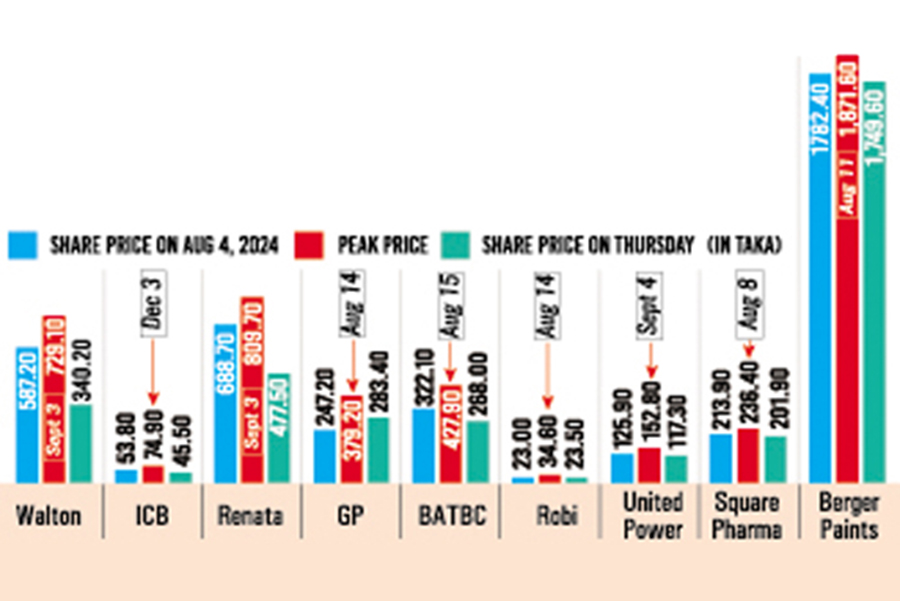Top listed firms see share prices plunge up to 47pc in ten months

Published :
Updated :

Top listed companies by market capitalisation, including telecom giant Grameenphone, have seen their share prices plunge by as much as 47 per cent since the fall of the Awami League government, contributing to a sharp decline in the benchmark equity index of Dhaka Stock Exchange.
During this 10-month period, the benchmark DSEX index dropped by 1,192 points, or 20 per cent, closing at 4,637 on Thursday last. This marks one of the steepest declines in recent years and underscores the volatility plaguing the country's equity market.
The downturn comes despite a brief period of optimism following the political transition in early August 2024. Investors had bet on a return to economic stability and improved governance, which initially drove a rally in large-cap stocks.
Grameenphone, a key market mover due to its significant market capitalisation, surged by 53 per cent to Tk 379.2 within just seven sessions after August 5, 2024.
However, the rally proved short-lived. The stock has since fluctuated heavily and settled at Tk 283.40 on Thursday last, down 25 per cent from its August peak and sharply lower from its ten-month high.
Similar patterns were observed across other market heavyweights. Square Pharmaceuticals, Walton Hi-Tech Industries, British American Tobacco Bangladesh (BATBC), BRAC Bank, Robi Axiata, Investment Corporation of Bangladesh (ICB), Renata, Beximco, and Berger Paints Bangladesh all posted gains following the change in government, only to experience steep corrections in the months that followed.
Md. Ashequr Rahman, managing director of Midway Securities, said junk stocks continue to rally without any justified reason, even as the overall market remains in dire straits.
But the surge in the blue-chip stocks after August 5 last surpassed all other listed companies.
"That appreciation was warranted for fundamentally strong companies, whose price movements had long been restricted by the floor price," Mr Rahman said.
Following the fall of the previous government, he added, prudent investors anticipated that companies with solid fundamentals would gain amid renewed hope for economic stability and improved governance.
Rahman also pointed out that multinational companies played a significant role in driving the appreciation of blue-chip stocks during that period.
Previously, listed multinational companies had refrained from recommending good dividends due to a lack of flexibility in repatriating funds to their overseas shareholders.
As a result, a large portion of foreign investors' capital remained idle on the sidelines.
"Those funds were injected into fundamentally strong stocks after the fall of the government," said Mr Rahman.
Apart from the blue-chip stocks, the majority of the listed securities experienced appreciation after August 5, leading to a record surge in the DSEX.
On August 6, the DSEX jumped 3.76 per cent or 197 points to 5,426 from the previous session.
Later, the majority of the blue-chip stocks continued to rally and the DSEX rose to 6015 points on August 11 with a rise of 10.85 per cent in just one week.
However, the optimism faded soon afterwards. The rally began to lose steam as weak demand persisted amid stagnant macroeconomic indicators.
Private sector credit growth, which stood at 9.86 per cent in August 2024, continued its downward trajectory, hitting a decade-low of 7.15 per cent by January 2025.
Md. Ashequr Rahman, managing director of Midway Securities, said that although the economy appeared to be on a positive path due to a contractionary monetary policy, the equity market failed to see liquidity supply.
The banks have already shifted their focus to treasury bonds, drawn by risk-free returns as high as 12 per cent or more.
Following the banks' lead, many fund managers of the equity market reshuffled their portfolios, increasing investments in the fixed-income securities.
Traditionally, the stock market responds positively when yields on government securities decline, as lower returns from bonds typically drive investors back to equities.
Of the treasury bonds which recently saw a cut in interest rates, the rate of 5-year T-bonds declined to 11.99 per cent from 12.39 per cent.
But such reduction in the yields of the fixed-income securities has failed to leave any positive impact on the equity market.
Many investors and market operators also are not happy with the performance of the securities regulator.
Rahman noted that amid the market's prolonged downtrend, even fundamentally strong stocks have failed to attract investors, a pattern that continues to plague the current market.
Meanwhile, the market leaders have continued their presence on the list of top 10 index draggers.
For example, the DSEX declined 17 points on May 26 last and on the day the erosion experienced by Square Pharmaceuticals alone wiped out 6.5 points.
The following day, the DSEX lost 41 points, with top 10 index draggers, including Square Pharmaceuticals and BATBC, wiping out 32 points.
Consequently, the equity market having majority number of weak companies and the burden of a substantial amount of negative equity worth Tk 97 billion continues to bleed.
However, many are optimistic regarding revival of the equity market as the government has moved to increase the number of quality equities through the listing of multinational and state-run companies.
mufazzal.fe@gmail.com


 For all latest news, follow The Financial Express Google News channel.
For all latest news, follow The Financial Express Google News channel.